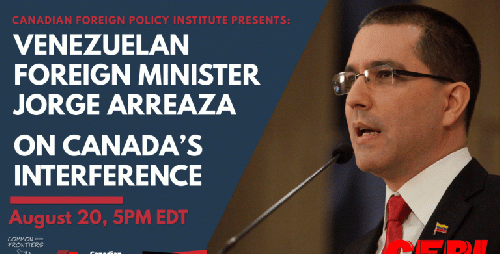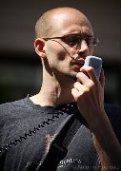
Historic event with Venezuelan Foreign Minister on 'Canadian Interference'
(Image by Yves Engler Website) Details DMCA
Join an historic event on Thursday, August 20. The foreign minister of a country of 30 million that's had diplomatic relations with Canada for seven decades will discuss Ottawa's efforts to overthrow his government.
Venezuelan Foreign Minister Jorge Arreaza will talk about "Canadian Interference in Venezuela." The event promotion reads:
"Nearly two years ago, the Trudeau government threw their wholehearted support behind a US-backed plan to declare an opposition politician, Juan Guiadà �, 'Interim President' of Venezuela. Since then, the Trump administration has orchestrated numerous coup attempts and appealed for an army mutiny against Nicola's Maduro. It has also adopted extreme unilateral coercive economic measures against the country. The Canadian government has sanctioned Venezuelan officials and built up an oppositional international coalition.
"Trump and Trudeau's sanctions and efforts to stoke a revolt are having an ever-greater impact on ordinary Venezuelans livelihood and ability to feed themselves. At the same time, Guaidà �'s chances of taking power are slimmer today than at any point since he claimed the presidency. "Still, Trudeau supports Washington's regime change efforts.
"Is there a limit to what the Liberals will support?"
One reason Canadians have an inaccurate view of their country's role in the world is that other countries' politicians generally avoid publicly challenging Canadian policy. They do so for a series of reasons, some of which are tied to Canada's somewhat unique position in global politics. Canada is a G7 nation that has been particularly close to the two main empires of the past two centuries. Yet it has never had formal colonies (First Nations aside) and has almost always played second or third fiddle to acts of US or British aggression. Partly because it doesn't get criticized internationally and the Canadian Left prefers to focus on US foreign policy, Ottawa has a comparatively clean reputation. As such, it's generally not considered strategic for any specific government to highlight Canada's bad behavior.
There are few, if any, historic equivalents to Arreaza's planned talk. I'm unaware, for instance, of a foreign politician delivering a lecture at a Canadian university critical of Canada's international policy. Here are the closest equivalents I came up with.
In September 1956 Egyptian leader Gamal Nasser condemned Ottawa for selling Israel F86 jets a month before invading its neighbor. He declared, "the supplying of Israel with arms despite her repeated aggressions against Arab frontiers is considered a hostile act aimed at the whole Arab nation." In the lead-up to the 1967 Israeli invasion Nasser again complained about Ottawa's "biased stand in favour of Israel."
In 1960 Congolese independence leader Patrice Lumumba told a crowd he went to Canada but was "disappointed to find that although honest, Canada was just another imperialist country." A decade later Salvador Allende's Minister of Finance criticized Canada's "banker's attitude" after Export Development Canada refused to finance Canadian exports to Chile. Ottawa did so as part of a broader US-led effort to isolate the socialist government.
Days after I poured fake blood on foreign affairs minister Pierre Pettigrew's hands and yelled "Pettigrew lies, Haitians die" during a June 2005 press conference on Haiti, ousted president Jean Bertrand Aristide was asked about the incident. In an interview in South Africa Aristide told journalist Naomi Klein the Canadian government had Haitian "blood on its hands."
In a similar vein popular opposition senator Moise Jean-Charles has repeatedly criticized Canada's role in the 2004 coup against Aristide. At a major 2013 demonstration against President Michel Martelly Jean-Charles told Haiti Liberte', "we are asking the Americans, French, and Canadians to come and collect their errand boy because he cannot lead the country any more."
After Canada backed the 2009 military coup against Manuel Zelaya, the ousted Honduran foreign minister told TeleSur that Ottawa and Washington were providing "oxygen" to the military government. Patricia Rodas called on Canada and the US to suspend aid to the de facto regime. During an official visit to Mexico with Zelaya, Rodas asked Mexican president Felipe Calderon, who was about to meet Prime Minister Stephen Harper and US President Barack Obama, to lobby Ottawa and Washington on their behalf. "We are asking [Calderon] to be an intermediary for our people with the powerful countries of the world, for example, the US and at this moment Canada, which have lines of military and economic support with Honduras."
The above examples are the closest parallels I could think of to Arreaza's talk on Canada's interference in Venezuela. But what distinguishes the Venezuelan foreign minister's upcoming event is the scope of the discussion. In addition, he is a sitting foreign minister and will talk directly to a Canadian audience.
The Venezuelan government appears ever more willing to push back against Canada's brazen campaign to overthrow it. As I detailed in "How Venezuela helped defeat Canada's Security Council bid", the only country's diplomats from what I saw that publicly campaigned against Canada's bid for a seat on the Security Council were Venezuelan.
The international community's rejection of Canada's bid for a seat on the Security Council offers internationalist minded Canadians an important opportunity to re-evaluate this country's international policies. Following Canada's second consecutive Security Council defeat a growing coalition of organizations and prominent Canadians have signed on to an open letter calling for a "fundamental reassessment of Canadian foreign policy."
(Note: You can view every article as one long page if you sign up as an Advocate Member, or higher).





